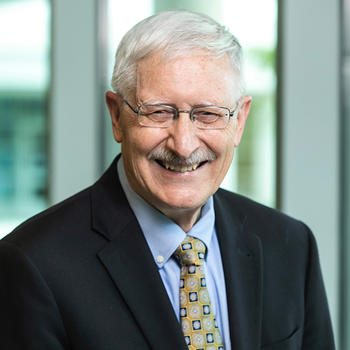In This Story

The seventh annual George Mason University Energy Forum, held Wednesday, April 23, addresses the complex and rapidly evolving intersection of artificial intelligence, data centers, and electric power demand. The all-day event will bring together leading experts, policymakers, and community stakeholders to discuss the energy challenges and opportunities presented by the data-driven economy in Northern Virginia, the United States, and the world.

It is also the first campus event featuring Distinguished University Professor Andrew Light, who returns to the Schar School of Policy and Government faculty after serving four years as Assistant Secretary for Energy for International Affairs at the Department of Energy.
Light, an affiliated faculty member with the College of Science, is co-organizing the Energy Forum titled “AI’s Grand Energy Challenge: Forging a Sustainable Digital Future for Virginia, the U.S., and the World.” He is joined by Schar School Distinguished Visiting Professor Ambassador (ret.) Richard D. Kauzlarich, who also serves as codirector of the Center for Energy Science and Policy (CESP).
The event is presented by CESP in collaboration with George Mason’s Institute for Philosophy and Public Policy (IPPP), which Light directs.
The insights and opinions offered during the April 23 forum, held from 8:30 a.m. to 5 p.m. at George Mason’s Mason Square Van Metre Hall in Arlington, Virginia, would be important conversations anywhere in the country, but the university’s location in Northern Virginia adds additional poignancy to the conversations.

“Northern Virginia stands as the world’s largest data center hub, making it a focal point for understanding the energy demands of the AI revolution,” said Kauzlarich. “As AI technologies advance, the region faces unprecedented challenges in balancing innovation with sustainable energy practices. This forum, built on George Mason’s tradition of addressing grand challenges facing our society, will delve into the critical need for an advanced energy network and the development of resilient digital infrastructure to support it at the global, national and state and local level.”
Throughout the day, panelists and speakers including technology and power executives, think tank officials, representatives of federal agencies, and community leaders will tackle the event’s key objectives:
- Understanding the Nexus: To provide a comprehensive understanding of the intricate relationship between AI, data centers, and electric power demand.
- Workforce Development: To address the need for workforce transition and upskilling, focusing on training professionals in microgrid operations, grid interconnection, and outage restoration.
- Community Engagement: To foster dialogue among community leaders and advocates, and business representatives, ensuring diverse community impacts are addressed.
Key topics include AI and its enormous energy demand—as well as its supply; the convergence of AI, energy, and climate change; and AI and data center impact on local communities, businesses, and the environment, as well as the question of how George Mason and other universities may contribute to solutions and the industry’s workforce development.
Andre W. Marshall, George Mason’s vice president for research, innovation, and economic impact, will deliver opening remarks. The keynote speaker for the event is David Sandalow, inaugural fellow at the Center on Global Energy Policy at Columbia University and former Undersecretary for Energy (Acting) and Assistant Secretary for Policy and International Affairs.
